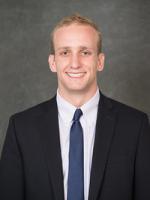
Student Profiles

1 Search Results

Sean Corcoran
NIH Cambridge Scholar MD/PhD
B.S. Biology, Massachusetts Institute of Technology, 2016
Medical student at Boston University School of Medicine (In progress)
Dr. Louis Staudt (NCI) and
Prof. Daniel Hodson (Cambridge)
Cancer biology, Metabolism, Inflammation
Sean graduated from the Massachusetts Institute of Technology (MIT) in 2016 with a B.S. in Biology. During his time at MIT, he spent 4 years in the lab of Rudolf Jaenisch, participating in projects involving neurological disease modeling. Over the course of his undergraduate career, the CRISPR/Cas9 gene editing revolution started and his main project became developing a system to create double strand breaks in mitochondrial DNA in order to create new tools for the greater scientific community to study mitochondrial biology.
After graduating, Sean went to work at CRISPR Therapeutics for a year. At CRISPR, he was a Research Associate in Hematology, and his team focused on making cures for Beta Thalassemia and Sickle Cell Disease. The work that he did at CRISPR Therapeutics is now in clinical trials in the US and Europe. Sean then moved on to start his MD/PhD at the Boston University School of Medicine. His love for cancer biology, which he found in a class he took his senior year of college based on the famous Hanahan and Weinberg review “The Hallmarks of Cancer,” led him to pursue his introduction to clinical medicine course in an oncology clinic. The educational experience in class combined with his clinical experience with patients opened his eyes to the complexities of cancer treatment and how much there still was to know about emerging hallmarks of cancer.
With this in mind, Sean chose to do his PhD in the field of Cancer Biology, and decided to join the labs of Louis Staudt at the NCI and Daniel Hodson at the University of Cambridge. In the Staudt and Hodson labs, Sean will work on aspects of Diffuse Large B-Cell Lymphoma. As a future physician scientist, Sean hopes to bring his love for patient care and research together to create cures for serious diseases.


